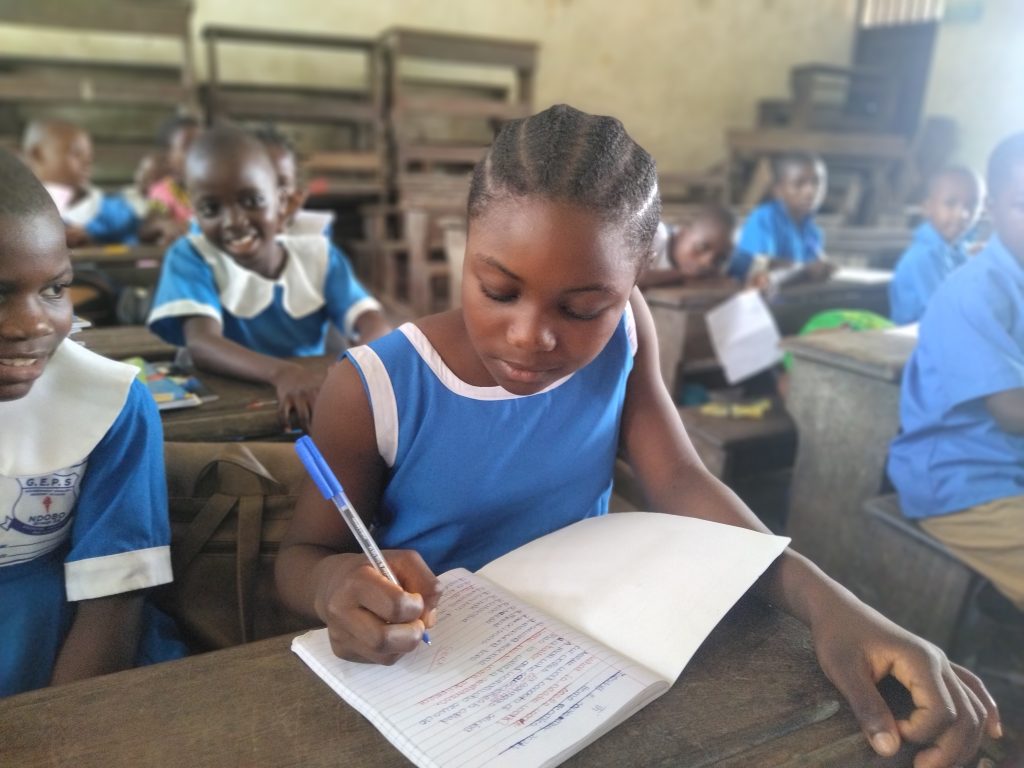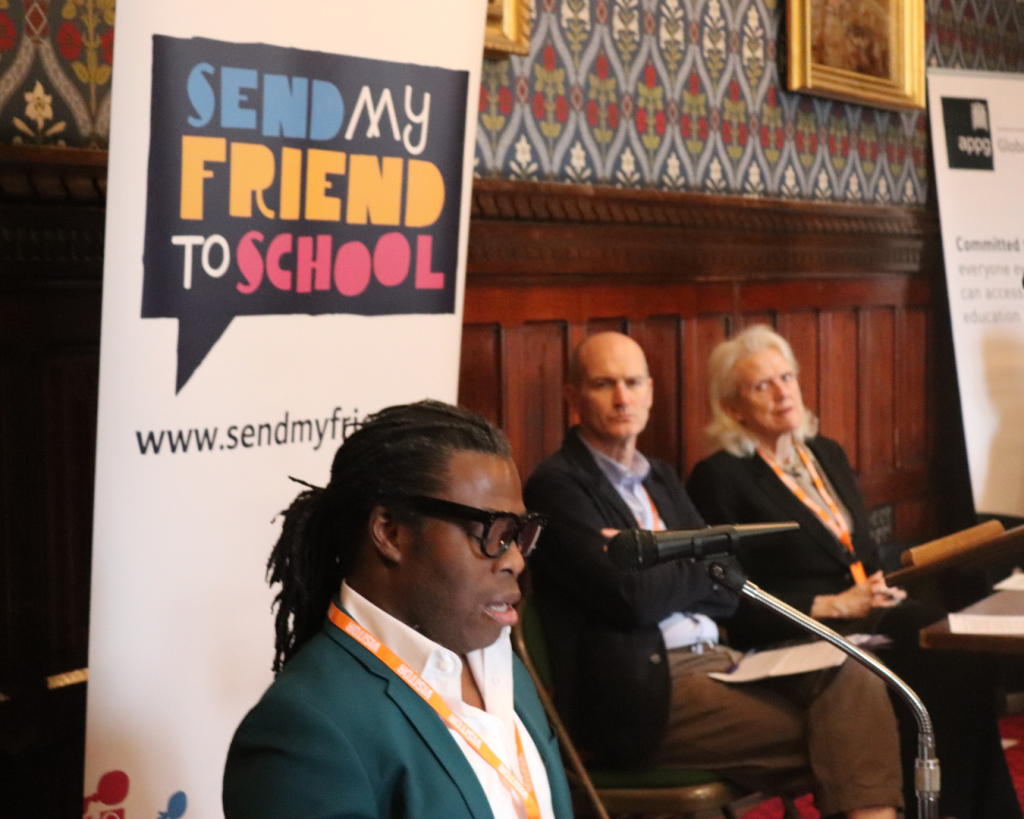
Image: Bih*, age 13, lives in Cameroon with her mother and four siblings. Her ability to enrol in school was made possible through financial support and the provision of school supplies.
Credit: Franck Nguengo / Street Child (2024)
With cuts to the UK’s Overseas Development Assistance (ODA) budget looming, funding for a wide range of life-saving work around the world is under threat. From fewer children vaccinated, to less funding for tackling child malnutrition, these cuts risk undoing decades of progress and leaving millions of people without access to a wide range of essential services and support.
Global education is under particular threat. Education has long been a core pillar of the UK’s international development work. But with only 0.3% of Gross Domestic Income (GNI) available to spend on international development, the UK Government is expected to struggle to fund even the few issues it has identified as its priorities.
Despite education’s proven role in driving development and opportunity, and the UK championing it as a key part of its international approach, its funding has been falling for a decade. As a share of the UK’s ODA budget, spending on education has fallen dramatically from 13.5% in 2013 to just 3.5% in 2023. Education was one of the worst-affected sectors the last time the UK ODA budget was reduced back in 2021. We cannot let this happen again.
Cutting education at a proportionate rate to the overall reduction of ODA will be devastating. As things stand, Save the Children UK estimates that 2.2 million children will lose support for gaining a decent education.
The UK remains a particularly important donor to education. It is one of the few donors that provides sizable support for basic education, which helps ensure children learn the foundational skills, such as reading and maths, they need to succeed in future levels of schooling. Most other donors spend more on higher education and scholarships. Until recently, the US was the only other major government donor that heavily focused on basic education. The Trump administration’s gutting of USAID resulted in education losing more money than any other sector, and has left the UK as one of the last bastions of support in this critical area.
The UK is also the largest donor to the Global Partnership for Education (GPE), a multilateral fund which uses a partnership model to strengthen education systems, and the second largest donor to Education Cannot Wait (ECW), the global fund for supporting education systems in emergencies. Both funds will need replenishing in 2026, putting them in a tricky position following replenishments from several other health funds in 2025, including GAVI and the Global Fund. The UK needs to set aside money for strong, multi-year pledges and encourage other donors to maintain their investment so that these funds can sustain their work.
While funding education must not come at the expense of other vital services, it is clear that it urgently needs renewed attention. Other parts of the ODA budget have ballooned in recent years, such as financial investments and spending within the UK, and the budget must be rebalanced to ensure UK aid reaches the areas it is truly intended for – poverty alleviation and lifting the most marginalised communities.
A campaign for protecting global education
Earlier this March, the Send My Friend to School Coalition launched its new campaign, Invest in My Friends’ Learning, urging the UK Government to protect and reprioritise global education. Hosted in Parliament by the APPG on Global Education, the launch brought together MPs, youth advocates, development experts and campaigners. It served as a powerful call to action for the UK government to protect and reprioritise global education – starting now.
The event featured passionate speeches about why education matters, not just as a development issue, but as a human right and a source of hope. Ade Adepitan, television presenter and Paralympian, spoke about how education changed his life, and what’s at stake when children are denied the same opportunity. Youth Campaign Champions from secondary schools across the UK delivered a powerful message – education is not a privilege but a basic right, one that lifts communities, reduces poverty and improves health.

Ade Adepitan, television presenter and Paralympian, speaks on the importance of education
at the Invest in My Friends’ Learning campaign launch in Parliament.
Education has long faced severe under-investment – a concerning trend that predates ODA cuts in the UK, US and other major donors around the world. As outlined in Send My Friend to School’s policy report for the campaign, there is currently a global annual funding gap of US $97 billion to meet Sustainable Development Goal 4 – ensuring quality education for all by 2030. These cuts are another backward step on the journey to that target.
The consequences of under-investment in education are wide-ranging and severe. Without basic skills like literacy and numeracy, young people are denied decent work, civic participation and the ability to shape their futures. Children out of school face increased risk of violence, exploitation and early marriage. Communities also lose out on skilled contributors – future doctors, engineers, political leaders, and business people. The global economy loses an estimated $10 trillion per year due to this failure, dwarfing the annual amount needed to fund education for every child. The cost of not investing is high and rising – the world cannot afford to continue this trend.
Aid is a part of the picture – but not the whole story
While ODA plays an important role, it has never been the answer to addressing gaps in funding in the long term. The most sustainable way to fund education is through domestic public resources – raised fairly by countries and spent on free, inclusive education systems. But many low- and middle-income countries are held back by unjust global systems, from unsustainable debt to tax loopholes and inadequate global financial rules.
The UK has a key role to play in reforming these systems. As an influential international leader and benefactor of these unequal financial rules, the UK is in a strong position to bring change and open the doors to more long-term, resilient, equitable, transparent and accountable financing for education in every country. As it pulls back from its responsibilities on ODA, the UK has a responsibility to do everything it can to now fix the broken systems which maintain historic inequities.
What we’re asking for
Results UK joins with Send My Friend to School in calling on the UK Government to:
- Reprioritise and protect UK ODA to education.
- Take action to ensure the Global Partnership for Education (GPE) and Education Cannot Wait (ECW) are fully funded.
- Support reforms to enable the growth of domestic budgets for public education.
You can help ensure education stays on the UK’s agenda! Take part in Results UK’s grassroots action this month on protecting education funding by:
Sharing the campaign: Talk to friends, colleagues or your local school about why global education financing matters – and how the UK can step up.
Writing to your Member of Parliament, sharing the report with them and urging them to appeal to the Minister for International Development Baroness Chapman.
*The child’s name has been changed to protect her identity